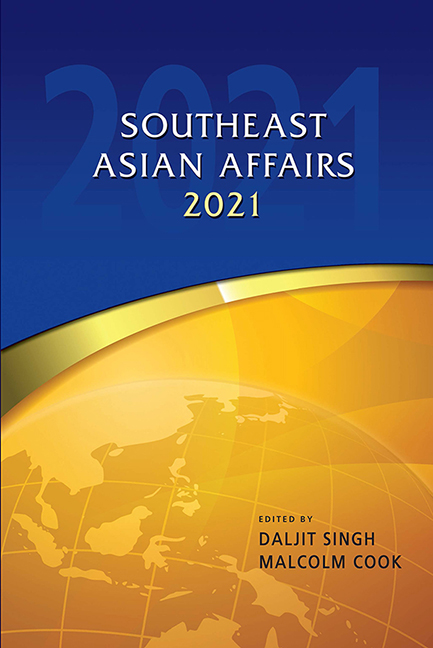Indonesia in 2020: COVID-19 and Jokowi’s Neo-liberal Turn
Published online by Cambridge University Press: 09 October 2021
Summary
After his inauguration to a second term in October 2019, Indonesian president Joko Widodo (or “Jokowi”) had looked forward to consolidating his political and economic legacy. Politically, his rule was stable. Jokowi commanded high approval ratings in the electorate and a large majority in the Indonesian legislature, and the turmoil associated with the large-scale Islamist mass protests in 2016 and 2017 had died down. Some of the president's former opponents had joined his government (his rival in the 2019 elections, Prabowo Subianto, became Jokowi's defence minister), while others kept a low profile or were even in long-term foreign exile (the leader of the 2016–17 demonstrations, Rizieq Shihab, resided in Saudi Arabia to escape legal investigations at home). Economically, Jokowi wanted to continue his vast infrastructure projects, make Indonesian businesses more competitive, and move the nation's capital from the overcrowded Jakarta to a remote location in East Kalimantan. His second term, the president hoped, would stand in clear contrast to that of his predecessor Susilo Bambang Yudhoyono, which had been widely criticized as a missed opportunity.
Of course, 2020 did not turn out the way Jokowi, or anyone else for that matter, had expected. From January, the world's news cycle was dominated by COVID-19, fundamentally changing political and economic trajectories. Jokowi's annoyance with this massive interruption of his second-term plans was palpable. At the start, he tried to ignore the issue and project a business-as-usual attitude, hoping that the virus would spare Indonesia. Indeed, he initially viewed the outbreak as an economic opportunity for Indonesia as it could—or so he claimed—absorb tourism flows from countries badly affected by the pandemic. Once Indonesia reported its first cases in early March, Jokowi realized that action was needed, but he was adamant to limit such action so as not to damage the economy. As a result, many epidemiologists criticized Jokowi for his soft approach, which led Indonesia to record the highest death and infection numbers in Southeast Asia. However, despite the fact that most of Indonesia's Southeast Asian neighbours did significantly better in containing the virus, Jokowi largely succeeded in keeping Indonesia out of the international COVID-19 headlines. To no small extent this was because of the massive outbreaks in the United States, Europe and parts of Latin America, which overshadowed Indonesia's own poor record.
- Type
- Chapter
- Information
- Southeast Asian Affairs 2021 , pp. 107 - 121Publisher: ISEAS–Yusof Ishak InstitutePrint publication year: 2021

